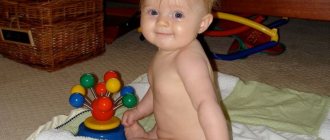The question of when a child begins to speak worries almost all parents. After all, mothers and fathers wait with great impatience for their baby to speak, to tell them what he wants, what upset him, what he is happy about or what he likes. Unfortunately, it is quite difficult to answer the question of what time he will start speaking, since there is simply no special “speech calendar”. No doctor can say exactly when impatient parents will hear their baby’s first words. This is all individual, the development of the speech apparatus comes from the body’s ability to perceive information, from the psyche and the ability to think.
Sometimes it happens that a child is silent until the age of 3, although parents and close relatives tried very hard to participate in the development of his speech. It also happens the other way around, when she is already a year old she chatters incessantly, thereby surprising her relatives.
It is believed that quiet children begin to speak earlier than their more active peers. There is an opinion that girls start chatting earlier, unlike boys.
It’s not a speech yet, but it’s time to get busy
The first sounds a baby makes are an important part of preparing the vocal apparatus for speech. This is humming, fluting and babbling. They are rather reflexive in nature and related to the needs of the baby. What time should that “agu” appear?
Auxiliary exercises:
- Finger gymnastics for children
- Articulation gymnastics for children
The baby begins to play at about 1.5 months. At first, these are drawn-out vowel sounds (a-a-a, u-u-u), closer to 3 months the combinations “abu”, “agu”, etc. appear. Then the baby will delight his parents with “songs” in which these syllables and combinations will be chanted (7 months). And by 8-9 months, babbling and the long-awaited “mother” will appear.
You can only hear “aha” when the baby is comfortable. After making sure that he is full, warm and dry, lean over him and clearly pronounce the sounds. The child will be happy to answer you!
As much communication as there should be, there should be as many smiles. What child would want to go out if the mother is gloomy and does not answer him. Respond to any desire to communicate, even if you have important things to do. Repeat “aha” and other combinations with the crumbs, insert new easy-to-pronounce sounds.
Why exactly "ahu"
Due to the imperfection of the articulatory apparatus, the vowels [a], [e], [u] are more like “g-gu” or “g-ha”. This is how the first guttural sounds are born. Their reproduction is easiest for the baby, because only the larynx is involved. So he gets an involuntary “aha” as he exhales. At first, the toddler himself does not understand how this happens, but after long training, he learns to give his “aha” an emotional connotation and inserts it into conversations with his mother.
Mom is the first word
Mothers especially look forward to this word. At what age does a child begin to pronounce the long-awaited 4 letters? Children reproduce the first babbling “mom” after 7 months. While this word doesn’t mean anything, these combinations of sounds are just easier for the baby.
The little one will consciously call his mother only after a year or even 1.5 years. Although most children start with the word “give”. This is understandable. Being able to say “give” is much more important and useful, and mom and dad will wait!
In order for your child to consciously turn to you as quickly as possible, he must be taught this. When performing any actions, comment: “Mom is going to the kitchen,” or “Mom is cooking porridge.” Hide and seek games will also help. Hiding behind a diaper or covering your face with your hands, ask your baby: “Where is mommy?”
When does a child start speaking in sentences?
No one can name any specific time frame for the development of correct, coherent and meaningful speech.
Some children break records, starting to speak at an early age, up to a year, while others remain silent for a long time and speak only at 5 years old.
There is one pattern - girls overcome this developmental milestone faster than boys.
When your children start speaking in sentences depends only on you: the efforts made for the child’s intellectual development are important; developmental exercises with it.
If your child is a late talker, don’t expect him to immediately begin to pronounce phrases in sentences. You need to wait patiently and work with the baby.
His mental and emotional state and the microclimate in the family play a huge role in the development of speech in a baby.
If the baby begins to talk, but is greatly frightened by something, he may stop talking. Therefore, parents are advised not to raise their voices to avoid stressful situations.
If a normally developing baby who does not have congenital diseases does not begin to speak at 4 years old, he needs help. For this purpose, speech therapists and child psychologists have developed special techniques.
By conducting such classes, logical thinking develops, perception of the outside world improves, which contributes to rapid development.
Becoming Conscious Speech
There are no uniform calendar dates and norms that state how many months a child should speak. However, speech formation usually occurs in stages in everyone: each baby starts with a funny “aha” and, ultimately, comes to correctly formed sentences.
Related material:
- How to teach a child to pronounce the letter R
- How to teach a child to pronounce the letter L
Babble or words?
The line between babbling and consciously spoken words is very thin, but still distinguishable. Babbling is syllables repeated many times, which are especially loved by the baby. But when the baby says “give” and points his finger at the desired object, this is already a real word.
It is difficult to answer with certainty when this will happen; all children go through a different path of speech development, which is influenced by many factors. One one-year-old child speaks 15 words, another only 2. At this age, it is more important that the baby understands the speech addressed to him, accumulating his passive vocabulary.
How can I check this? Ask your child to give you a doll or a ball. If he fulfills the request or at least finds the object with his eyes, everything is in order.
How the active vocabulary grows
On average, the active vocabulary of one-year-old children is replenished with 1-6 words per month. This can continue for up to two years. But most often, after 1-1.5 years, the time for a “lexical leap” comes, in which the baby “produces” 8-10 words every week.
And after a few months, a “lexical explosion” may even occur, where the baby learns as many words in a day as he had previously learned for weeks.
The appearance of phrases and two-word sentences
The speech of 1.5 year old children is still very difficult to understand. They can highlight only stressed syllables or leave only the last combinations. But it is precisely this age that is considered the starting point for the emergence of phrases. For example, they may sound like this: “Give me ok,” which means “Give me juice.”
After 2 years, offers appear. They still consist of 2-3 simple words and do not follow grammatical rules.
If the child does not speak in sentences or phrases before the age of 2.5 years, parents need to contact a pediatric neurologist to rule out delayed speech development (SDD).
Until the age of 2 - 2.5 years, a child is usually understood only by relatives; at an older age (about 3 - 4 years), the child becomes a full-fledged interlocutor, uses common sentences, correctly coordinates words, tirelessly asks questions “Why?”, “When?”.
Favorable conditions for speech development
If we do not take into account cases of organic lesions of the central nervous system, organs of vision and hearing, or physiological features of the structure of the speech apparatus, the development of speech proceeds along the indicated steps if several conditions are met:
- creation of a developing speech environment;
- accumulation of passive vocabulary;
- Encouraging the baby's speech activity.
Creating a developing speech environment begins with organizing a space around the child that will provide reasons for his own speech activity and speech interaction between the child and the adult. These are books, toys, posters, photographs, pictures, figurines, panels, and even patterns on wallpaper - everything that a mother might be interested in telling her baby about day after day.
Reading nursery rhymes and singing songs during special moments has an excellent cumulative effect. Simple texts with a special rhythm not only organize the usual procedures of washing, dressing, eating, falling asleep, but are also firmly fixed in the baby’s memory through repeated repetition. Daily use of nursery rhymes, poems, songs during these procedures, and not routine muttering, but bright and expressive emotional reading with emphasized articulation will soon be rewarded first by recognizing the names of body parts, items of clothing and household items, and soon by the appearance of these words in active speech child.
Other ways to replenish passive vocabulary include reading to your child and talking to him about any subject.
It is important to remember that the “mom-radio” mode, when the mother comments on everything that happens, everything that the baby sees or, presumably, feels, should not have been turned on non-stop.
The child needs time to process the impressions received, to play independently, to relax, to listen to the sounds outside the window and to the sounds of silence too. So in the development of speech, as in other areas of development, it is important not to rush from one extreme to another and to observe moderation in using even the most useful, at first glance, activities and techniques.
Why is the child silent?
Many parents have probably heard about such cases when a child begins to speak immediately in sentences. At the same time, until a certain age, the baby was completely silent. This is rather an exception to the rule.
If a child under 3 years of age has not spoken, you need to look for the reasons for the “silence” in order to correct them in time. Among them there will not necessarily be medical problems - delayed maturation of the nervous system, birth injuries, hearing impairment, etc. There are other factors that cause children to start speaking late.
Fine motor skills are underdeveloped
The hand is the second organ of speech, and how hard a child’s fingers work directly determines what time the child will speak. From the first months you need to give your baby a massage, then you can play finger games (for example, “magpie”). From the age of 1.5, master creative activities - modeling, drawing, appliqué.
Lack of motivation
Sometimes parents are overly protective of their child, guessing his wishes on the fly. Why learn to speak if everyone already understands you! When the baby points his finger at an object, do not rush to serve it right away. Let him have a need for the ability to speak, and even if not everything turns out correctly right away, he will soon learn to name the objects he needs.
Persistent learning
Some parents are very persistent in teaching their child to speak. Tirelessly demanding that the word be repeated after them, they become irritated when the baby does not pronounce it correctly and correct him. Such methods can only close the crumbs.
Excess of emotions
But the opposite situation happens. The baby said the word, mom and dad are happy. He noticed their reaction and repeated the word again, but its meaning was never fixed in the toddler’s mind. To make it memorable, you need to associate the name with the subject.
Lack of attention
Parents busy with work completely forget about the child, paying off with toys and leaving him to his own devices. And if the baby does not yet go to kindergarten, the lack of communication leads to a lag in speech development.
Answers to frequently asked questions by parents
How do children start talking?
At first, unconsciously, when the pronounced sounds are the result of vocal reactions at randomly occurring positions of the speech organs. The intonation of speech of the people around you gradually changes and is copied. Then - first syllables, and then simple words of a rather onomatopoeic nature.
Well, and progressively: simple words, spoken, albeit not very clearly, but with meaning, appeals to loved ones, bright intonation, telling simple rhymes, and, of course, the famous “why” and “why.”
What time do girls and boys start speaking? Is there a difference?
According to statistics, boys begin to talk later than girls, at approximately 2.5-3 years. Although this is also individual.
How to understand that a child will speak soon?
If your baby is already 2 years old and he pronounces syllables, imitates the sounds of living nature, if he is active, cheerful, hears live human speech and is a participant in communication between close people, then have no doubt - he should be about to speak.
If the family is bilingual, how does this affect when the child should start speaking?
Children are very receptive to languages. Moreover, before the age of 5, learning a second language is very easy. Mastering two at once may lead to some speech delay, but it will be insignificant and implicit.
What other children start talking later?
Later, overly emotional children may begin to speak, because words cannot “keep up” with emotions. They are too calm, they are also silent - they listen and think more.
Kids, whom adults understand without words, fulfilling all their wishes, are also in no hurry to learn to talk. Or those who achieve everything by shouting.
How can you help your child speak faster?
- Develop fine motor skills: all kinds of finger games, construction sets, modeling, pouring cereals and pasta with hands, crafts with pine cones, stringing beads, lacing and other creativity.
If the child is left-handed
Why is it not worth retraining a left-handed person and how can this affect his speech? By forcing the baby to work with his right hand, mom and dad shift the innate functions of the “commander” of the right hemisphere of the brain to the left hemisphere, which is not ready for this. As a result, speech perceived by ear “does not know” in which hemisphere it should “settle.” Retrained left-handers not only speak later, but their other abilities do not fully develop.
When is it time to worry
Touching on the topic of when a child begins to speak, Komarovsky, like other pediatricians, admits that until the age of 3, a preschool child is allowed to develop without regard to his peers. But if by this age children remain “silent” or have problems with sound pronunciation, it is worth contacting neurologists and speech therapists in order to correct the problems as early as possible.
Komarovsky himself believes that one should think not about how much and how correctly a child speaks at this stage, but about how this skill is formed over time. If a child at 2 years old knows only 10 words, this is not as scary as when at 3 years old his vocabulary has not been replenished.
And, before sounding the alarm, Komarovsky urges, one should adequately assess the development of the baby.
Factors influencing speech delay
This pathology does not arise on its own. There are a huge number of factors influencing the development of a child’s speech. Reasons for a baby's speech delay:
Intracranial hypertension
- trauma during childbirth
- brain pathologies
- dyslexia
- antenatal pathology
- mental disorder
- intracranial hypertension
- hearing loss
- underdevelopment of the muscles of the mouth and face
- injuries
If the cause of the delay in speech development has not been clarified, this significantly complicates therapy. Therefore, the child needs to undergo a comprehensive examination; this is the only way the doctor will make a diagnosis.
What to do to make your toddler speak on time
Most parents come to their senses too late and begin to look for ways to “talk” their child. Meanwhile, work must begin from birth. What recommendations do psychologists and speech therapists give?
- Turn off the TV. Excessive background noise harms speech development.
- Talk to the baby from birth. Pronounce the sounds clearly and slowly in a gentle tone.
- Never “babble” when addressing a baby. By distorting sounds in this way, you deprive the baby of correct speech perception.
- Use only simple phrases and sentences. Children ignore long, incomprehensible constructions.
- Become an active interlocutor with your child. Yes, many children talk to themselves, but if they are not supported, they quickly become silent.
- Demonstrate the operation of the articulatory apparatus. In the first months after birth, when the child is just mastering simple sounds, he needs to see how your organs work when producing speech. Speech therapists also recommend this technique: when pronouncing a word or syllable, place your little one’s palm on your lips so that he can feel them moving.
- Don't simplify words. A child will never begin to speak correctly, for example, “car” and “dog,” if his parents repeat “beep-beep” and “woof-woof” after him.
- Immediately call a spade a spade. When faced with some complex word, for example, leopard, parents “simplify” it to “kisi.” But sooner or later the child learns that besides the cat, there are many other animals similar to it - lion, tiger, cheetah, lynx, and each has its own name.
- Answer every little “why” in detail. By denying it over and over again, you destroy your preschooler’s cognitive interest, and next time he will not be interested in a new phenomenon.
Mothers’ favorite pastime, says Komarovsky, is constantly looking for non-existent “irregularities” in their child. Let him develop in his own way and before you know it, he will start talking and catch up with his peers.
Balance of active and passive vocabulary, or why develop speech?
A passive dictionary will always be larger in volume than an active one. At the same time, we should strive to achieve a balance between dictionaries, that is, try to use as many words as possible that we know in everyday speech. And teach this to our children. For what?
In modern society, people who can speak well and interestingly, with developed oratory skills, are valued. The ability to express one’s thoughts clearly and beautifully, captivate the audience, and win the interlocutor to one’s side will help the child in school, in communicating with peers, and throughout life. In addition, an increase in vocabulary entails the development of intelligence, memory, attention, imagination and perception.
A child with a rich vocabulary communicates more easily with adults and other children, and accordingly, adapts better in society. It is easier for such children to learn poetry, solve logical problems, create, and, in general, realize themselves.
What to do if the child does not speak? Read about the signs that should alert parents.
Share your story: when did your child start talking and what was his first word?
- share with your friends!
Experts: Olga Ivanova
Educational program for parents
The task of parents is not only to organize favorable conditions for the child to successfully master speech, but also to ensure that it is literate. In addition to fiction, the standard of language is the parent’s own speech. This is where many questions arise, because in order to teach a child to speak correctly, you need to know how words are used.
Thematic material:
- When a child starts to gurgle and gurgle
- How to develop a child's speech at 1 year old
“I’ll vacuum” or “I’ll vacuum”?
The little “why” will definitely ask this question, don’t hesitate. How to answer when you yourself doubt both options?
Both “I’ll vacuum” and “I’ll vacuum” would be a mistake. The verb “vacuum” is limited in the formation of some personal forms. In the Russian language, he is not the only one, for example, the words win, weird, etc. also cannot be conjugated in this way.
It’s correct to say: “I want to vacuum”, “I want to win”, etc.
Should or need?
“Should” and “need” are synonyms. There is only a slight difference in their use. “It is necessary” rather speaks of obligation and is associated with action, while “need” is a desire or need (need). “It is necessary” is more rigid and strong, “need” is less urgent.
These are just a few examples. In any case, never be afraid to seem ignorant of something to your child. You just need (or should!) always have spelling and explanatory dictionaries at hand, where you, together with your inquisitive offspring, can find out how to speak correctly and competently.
When did your child start talking? Share your experience in the comments!
How to help a child start talking, exercises
To help your baby pronounce words well, you need to follow some recommendations from experts:
- Talk to your baby constantly. Share your feelings, emotions; tell him what you see and do, praise him more often. Replacing live communication with TV or audio recordings is not the best way to understand the world around you; this will not bring results.
- Develop hand motor skills - it develops the area of the brain responsible for speech. Play games with your son or daughter that involve your fingers and palms, color in coloring books, and practice drawing. Involve your baby in the household, sort out cereals together, string beads, etc. Don’t forget about massage; it’s useful to knead your palms and heels.
- Conduct daily classes, performing developmental exercises: ask to name an object, describe a picture, continue a rhyme. If your child pronounces the letter r poorly, practice articulation with him: say tongue twisters with this sound; Using your own example, in front of a mirror, show how the tongue moves correctly, etc.
Attention. Do not lose sight of speech delays in a child, this may be a signal of the development of some disease.
If the baby’s speech does not meet the standards, immediately contact specialists: neurologists, speech therapists, speech pathologists.
Don't expect him to speak on his own, without anyone's help. The sooner the problem is discovered, the sooner the baby will be helped.











